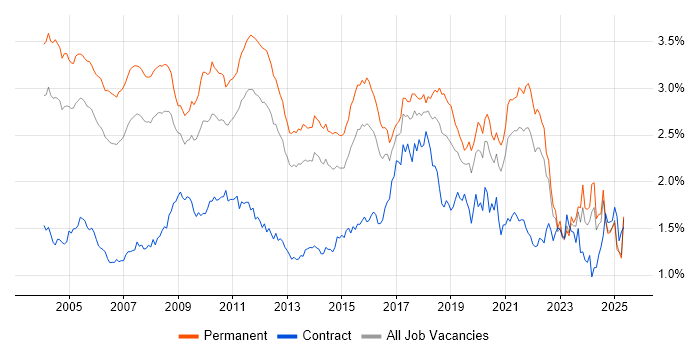Relational Database
England > South East
The table below provides summary statistics for permanent job vacancies advertised in the South East requiring Relational Database skills. It includes a benchmarking guide to the annual salaries offered in vacancies that cited Relational Database over the 6 months leading up to 30 May 2025, comparing them to the same period in the previous two years.
| 6 months to 30 May 2025 |
Same period 2024 | Same period 2023 | |
|---|---|---|---|
| Rank | 206 | 160 | 227 |
| Rank change year-on-year | -46 | +67 | -125 |
| Permanent jobs citing Relational Database | 107 | 281 | 180 |
| As % of all permanent jobs advertised in the South East | 1.11% | 1.60% | 1.28% |
| As % of the Database & Business Intelligence category | 8.91% | 10.37% | 7.25% |
| Number of salaries quoted | 23 | 164 | 105 |
| 10th Percentile | £37,250 | £30,000 | £31,750 |
| 25th Percentile | £39,750 | £45,938 | £46,250 |
| Median annual salary (50th Percentile) | £55,565 | £55,000 | £57,500 |
| Median % change year-on-year | +1.03% | -4.35% | +2.68% |
| 75th Percentile | £67,875 | £65,250 | £75,000 |
| 90th Percentile | £73,500 | £77,500 | £81,250 |
| England median annual salary | £64,500 | £60,000 | £65,351 |
| % change year-on-year | +7.50% | -8.19% | +13.65% |
All Database and Business Intelligence Skills
South East
Relational Database falls under the Databases and Business Intelligence category. For comparison with the information above, the following table provides summary statistics for all permanent job vacancies requiring database or business intelligence skills in the South East.
| Permanent vacancies with a requirement for database or business intelligence skills | 1,201 | 2,709 | 2,484 |
| As % of all permanent jobs advertised in the South East | 12.46% | 15.45% | 17.69% |
| Number of salaries quoted | 685 | 2,003 | 1,653 |
| 10th Percentile | £32,500 | £35,050 | £36,250 |
| 25th Percentile | £41,250 | £42,500 | £45,000 |
| Median annual salary (50th Percentile) | £56,000 | £55,000 | £57,500 |
| Median % change year-on-year | +1.82% | -4.35% | +4.55% |
| 75th Percentile | £71,250 | £67,500 | £71,250 |
| 90th Percentile | £83,750 | £83,750 | £87,500 |
| England median annual salary | £62,500 | £57,500 | £65,000 |
| % change year-on-year | +8.70% | -11.54% | +8.33% |
Relational Database
Job Vacancy Trend in the South East
Job postings citing Relational Database as a proportion of all IT jobs advertised in the South East.

Relational Database
Salary Trend in the South East
3-month moving average salary quoted in jobs citing Relational Database in the South East.
Relational Database
Salary Histogram in the South East
Salary distribution for jobs citing Relational Database in the South East over the 6 months to 30 May 2025.
Relational Database
Job Locations in the South East
The table below looks at the demand and provides a guide to the median salaries quoted in IT jobs citing Relational Database within the South East region over the 6 months to 30 May 2025. The 'Rank Change' column provides an indication of the change in demand within each location based on the same 6 month period last year.
| Location | Rank Change on Same Period Last Year |
Matching Permanent IT Job Ads |
Median Salary Past 6 Months |
Median Salary % Change on Same Period Last Year |
Live Jobs |
|---|---|---|---|---|---|
| Thames Valley | +23 | 51 | £55,283 | +0.51% | 206 |
| Berkshire | +30 | 43 | £37,500 | -48.28% | 133 |
| Surrey | +40 | 26 | £33,000 | -42.36% | 43 |
| Hampshire | -9 | 16 | £52,500 | -7.49% | 70 |
| Oxfordshire | +36 | 6 | £65,000 | +13.00% | 23 |
| Middlesex | -15 | 6 | - | - | |
| Kent | +15 | 4 | £65,000 | +2.36% | 43 |
| West Sussex | +38 | 3 | £72,500 | +70.59% | 21 |
| Buckinghamshire | -11 | 2 | £65,250 | +18.64% | 50 |
| East Sussex | +14 | 1 | £57,500 | +9.52% | 24 |
| Relational Database England |
|||||
Relational Database
Co-occurring Skills and Capabilities in the South East by Category
The follow tables expand on the table above by listing co-occurrences grouped by category. The same employment type, locality and period is covered with up to 20 co-occurrences shown in each of the following categories:
|
|
||||||||||||||||||||||||||||||||||||||||||||||||||||||||||||||||||||||||||||||||||||||||||||||||||||||||||||||||||||||||||||||
|
|
||||||||||||||||||||||||||||||||||||||||||||||||||||||||||||||||||||||||||||||||||||||||||||||||||||||||||||||||||||||||||||||
|
|
||||||||||||||||||||||||||||||||||||||||||||||||||||||||||||||||||||||||||||||||||||||||||||||||||||||||||||||||||||||||||||||
|
|
||||||||||||||||||||||||||||||||||||||||||||||||||||||||||||||||||||||||||||||||||||||||||||||||||||||||||||||||||||||||||||||
|
|
||||||||||||||||||||||||||||||||||||||||||||||||||||||||||||||||||||||||||||||||||||||||||||||||||||||||||||||||||||||||||||||
|
|
||||||||||||||||||||||||||||||||||||||||||||||||||||||||||||||||||||||||||||||||||||||||||||||||||||||||||||||||||||||||||||||
|
|
||||||||||||||||||||||||||||||||||||||||||||||||||||||||||||||||||||||||||||||||||||||||||||||||||||||||||||||||||||||||||||||
|
|
||||||||||||||||||||||||||||||||||||||||||||||||||||||||||||||||||||||||||||||||||||||||||||||||||||||||||||||||||||||||||||||
|
|
||||||||||||||||||||||||||||||||||||||||||||||||||||||||||||||||||||||||||||||||||||||||||||||||||||||||||||||||||||||||||||||
